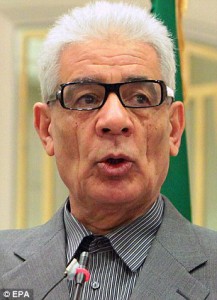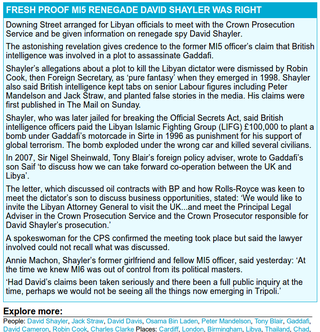A look at the forensic and police failures around the investigation of the still inexplicable death of intelligence officer, Gareth Williams, in London in 2010.
Here’s the link.
A look at the forensic and police failures around the investigation of the still inexplicable death of intelligence officer, Gareth Williams, in London in 2010.
Here’s the link.

 The end of April saw me basking in the hot and sunny weather of Geneva, where I had been invited to give a talk (Download Geneva) at the Swiss Press Club.
The end of April saw me basking in the hot and sunny weather of Geneva, where I had been invited to give a talk (Download Geneva) at the Swiss Press Club.
We had a lovely time in Geneva, and many thanks to Jean-Philippe Ceppi and the rest of the team for such a warm, interested and interesting welcome.
What a mess, what a cover-up. The inquest into the sad, strange death of Gareth Williams concluded yesterday, with the coroner raising more questions than she was able to answer.
It was also patently obvious that both MI6 and the Metropolitan Police Counter-Terrorism Squad (SO15) hampered the investigation, for the inevitable reasons of “national security”.
When will MI6 realise that it is not above the law?
My heart goes out to Gareth’s family.
 I have always been ideologically opposed to war and all the horrors that flow in its wake: agonising fear and death, famine, displacement, maiming, torture, rape, internment and the breakdown of all the hard-won values of civilised human law and behaviour.
I have always been ideologically opposed to war and all the horrors that flow in its wake: agonising fear and death, famine, displacement, maiming, torture, rape, internment and the breakdown of all the hard-won values of civilised human law and behaviour.
Looking back, I think that was partly why I was attracted to work in diplomacy and how I ended up being enticed into intelligence. These worlds, although by no means perfect, could conceivably be seen as the last-ditch defences before a country goes bellowing into all-out war.
I marched against the Iraq war, toured the UK to speak at Stop the War meetings, worked with Make Wars History, and have ceaselessly spoken out and written about these and related issues.
 Today in the UK we have reached a consensus that Blair’s government lied to the country into the Iraq war on the false premise of weapons of mass destruction, and subsequently enabled the Bush administration to do the same in the USA, hyping up the threat of a nuclear Iraq using false intelligence provided by MI6.
Today in the UK we have reached a consensus that Blair’s government lied to the country into the Iraq war on the false premise of weapons of mass destruction, and subsequently enabled the Bush administration to do the same in the USA, hyping up the threat of a nuclear Iraq using false intelligence provided by MI6.
Millions of people marched then, and millions of people continue to protest against the ongoing engorgement of the military/intelligence complex, but nothing ever seems to change. It’s democratically disempowering and an enervating experience. What can we do about it?
I have a couple of suggestions (The New Stuff), but first let’s look at some of the most egregious current fake realities.
 Last year we had the spectacle of the current No 10 incumbent, Dave Cameron, stating that the Libyan intervention would be nothing like Iraq — it would be “necessary, legal and right”. But there was no subsequent joined-up thinking, and Blair and his cronies have still not been held to account for the Iraq genocide, despite prima facie breaches of international war law and of the Official Secrets Act.…
Last year we had the spectacle of the current No 10 incumbent, Dave Cameron, stating that the Libyan intervention would be nothing like Iraq — it would be “necessary, legal and right”. But there was no subsequent joined-up thinking, and Blair and his cronies have still not been held to account for the Iraq genocide, despite prima facie breaches of international war law and of the Official Secrets Act.…
 But help might be at hand for those interested in justice, courtesy of Abdel Hakim Belhaj, former Libyan Islamic Fighting Group leader, MI6 kidnapping and torture victim, and current military commander in Tripoli.
But help might be at hand for those interested in justice, courtesy of Abdel Hakim Belhaj, former Libyan Islamic Fighting Group leader, MI6 kidnapping and torture victim, and current military commander in Tripoli.
After NATO’s humanitarian bombing of Libya last year and the fall of Gaddafi’s régime, some seriously embarrassing paperwork was found in the abandoned office of Libyan Foreign Minister and former spy head honcho, Musa Kusa (who fled to the UK and subsequently on to Qatar).
These letters, sent in 2004 by former MI6 Head of Terrorism and current BP consultant, Sir Mark Allen, gloatingly offer up the hapless Belhaj to the Libyans for torture. It almost seems like MI6 wanted a gold star from their new bestest friends.
Belhaj, understandably, is still slightly peeved about this and is now suing MI6. As a result, a frantic damage-limitation exercise is going on, with MI6 trying to buy his silence with a million quid, and scattering unattributed quotes across the British media: “it wasn’t us, gov, it was the, er, government.…”.
Which drops either (or both) Tony Blair and Jack Straw eyebrow-deep in the stinking cesspit. One or other of them should have signed off on Belhaj’s kidnapping, knowing he would be tortured in Tripoli. Or perhaps they actually are innocent of this.…. but if they didn’t sign off on the Belhaj extraordinary kidnapping, then MI6 was running rampant, working outside the law on their watch.
Either way, there are serious questions to be answered.
 Both these upstanding politicians are, of course, suffering from political amnesia about this case. In fact, Jack Straw, the Foreign Secretary at the time of the kidnapping, has said that he cannot have been expected to know everything the spies got up to — even though that was precisely his job, as he was responsible for them under the terms of the Intelligence Security Act 1994, and should certainly have had to clear an operation so politically sensitive.
Both these upstanding politicians are, of course, suffering from political amnesia about this case. In fact, Jack Straw, the Foreign Secretary at the time of the kidnapping, has said that he cannot have been expected to know everything the spies got up to — even though that was precisely his job, as he was responsible for them under the terms of the Intelligence Security Act 1994, and should certainly have had to clear an operation so politically sensitive.
In the wake of Afghanistan, Iraq and Libya, what worries me now is that exactly the same reasons, with politicians mouthing exactly the same platitudinous “truths”, are being pushed to justify an increasingly inevitable strike against Iran.
Depressing as this all is, I would suggest that protesting each new, individual war is not the necessarily the most effective response. Just as the world’s markets have been globalised, so manifestly to the benefit of all we 99%-ers, have many other issues.
Unlike Dave Cameron, we need to apply some joined-up thinking. Global protest groups need to counter more than individual wars in Iraq, Afghanistan, Pakistan, Somalia, Libya, Sudan (North and South), Syria, Iran.….. sorry, I’m getting writer’s cramp just enumerating all the current wars.
Give me a while to overcome my moral spasm, and I shall return with a few suggestions about possible ways forward — 21st Century Pacifism; the New Stuff.

Here is the film of the debate at the SKUP investigative journalism conference in Norway on 25 March 2012:
I had an immensely stimulating time during my recent mini-tour of Scandinavian investigative journalism conferences, meeting informed, interesting, and interested people.
The focus of my talks was the nexus between the intelligence world and the media — lessons I had learned, researched and deduced during the whistleblowing years and beyond. I have heard so many hair-raising media stories over the years.…
And, having listened to the experiences of journalists from a wide variety of other countries, it seems I am on the right track.
 First stop was the Grav conference in Sweden, where I gave a talk and had the pleasure of meeting investigative journalists who confirmed what I was saying, even if some of them didn’t think I had quite gone far enough! We also had fun at the “mingel” evening.
First stop was the Grav conference in Sweden, where I gave a talk and had the pleasure of meeting investigative journalists who confirmed what I was saying, even if some of them didn’t think I had quite gone far enough! We also had fun at the “mingel” evening.
Next stop, next day, was the SKUP conference in Norway where I did a talk, and also a debate about the media and whistleblowers. Note to self: never, ever agree to do a morning debate after the legendary SKUP party the night before.
Finally, last weekend, I visited the Tutki 2012 journalism conference in Finland (Download Helsinki_Talk). The response was overwhelmingly positive, and once again I had confirmation of what I was saying from the journalists themselves.
So what can we do about this situation? I shall keep spreading the word, and the journalists themselves just need to keep saying a resounding “no” to the inducements, at least if they want to work on meaningful investigations. And what real journalist doesn’t, au fond?
Next stop Geneva, which is why I’m limbering up with the French.
I recently did the opening keynote at the Big Dig investigative journalism conference in Copenhagen. Thanks to the organisers for a wonderful weekend!
Last October I had the pleasure of speaking at the excellent Mediafabric conference in Prague. The focus of my talk was the future of intelligence, whistleblowing and journalism.
The event was organised by Sourcefabric, an international organisation that provides open source tools and solutions for journalists, so it was an eclectic and stimulating crowd of journalists, geeks, hacktavists and designers. So well done and thank you to the organisers.
Here’s the video:
A review on “Cinepolitics” of the new film of John Le Carre’s classic spy novel, and its continuing relevance:
Libya, MI6, torture, and more happy subjects discussed recently on “Africa Today” on Press TV.
The programme was interesting, informed and balanced. Do have a watch:
This article in today’s New York Times, particularly these following two paragraphs, sent a shiver down my spine for the fate of the Libyan people:
 “The most powerful military leader is now Abdel Hakim Belhaj, the former leader of a hard-line group once believed to be aligned with Al Qaeda.The growing influence of Islamists in Libya raises hard questions about the ultimate character of the government and society that will rise in place of Col. Muammar el-Qaddafi’s autocracy.….
“The most powerful military leader is now Abdel Hakim Belhaj, the former leader of a hard-line group once believed to be aligned with Al Qaeda.The growing influence of Islamists in Libya raises hard questions about the ultimate character of the government and society that will rise in place of Col. Muammar el-Qaddafi’s autocracy.….
.…Mr. Belhaj has become so much an insider lately that he is seeking to unseat Mahmoud Jibril, the American-trained economist who is the nominal prime minister of the interim government, after Mr. Jibril obliquely criticized the Islamists.”
The Libyans, finally free of Gaddafi’s 42-year dictatorship, now seem faced with a choice between an Islamist faction that has stated publicly that it wants to base the new constitution on Sharia — a statement that must have caused a few ripples amongst Libya’s educated and relatively emancipated women — or a new government headed up by an American-trained economist.
 And we all know what happens to countries when such economists move in: asset stripping, the syphoning off of the national wealth to transnational mega-corps, and a plunge in the people’s living standards. If you think this sounds extreme, then do get your hands on a copy of Naomi Klein’s excellent “Shock Doctrine” — required reading for anyone who wants to truly understand the growing global financial crisis.
And we all know what happens to countries when such economists move in: asset stripping, the syphoning off of the national wealth to transnational mega-corps, and a plunge in the people’s living standards. If you think this sounds extreme, then do get your hands on a copy of Naomi Klein’s excellent “Shock Doctrine” — required reading for anyone who wants to truly understand the growing global financial crisis.
Of course, this would be an ideal outcome for the US, UK and other western forces who intervened in Libya.
Mr Belhaj is, of course, another matter. Not only would an Islamist Libya be a potentially dangerous result for the West, but should Belhaj come to power he is likely to be somewhat hostile to US and particularly British interests.
Why? Well, Abdul Hakim Belhaj has form. He was a leading light in the Libyan Islamic Fighting Group, a terrorist organisation which bought into the ideology of “Al Qaeda” and which had made many attempts to depose or assassinate Gaddafi, sometimes with the financial backing of the British spies, most notably in the failed assassination plot of 1996.
Of course, after 9/11 and Gaddafi’s rapprochement with the West, this collaboration was all air-brushed out of history — to such an extent that in 2004 MI6 was instrumental in kidnapping Belhaj, with the say-so of the CIA, and “extraordinarily rendering” him to Tripoli in 2004, where he suffered 6 years’ torture at the hands of Libya’s brutal intelligences services. After this, I doubt if he would be minded to work too closely with UK companies.
So I’m willing to bet that there is more behind-the-scenes meddling from our spooks, to ensure the ascendency of Jibril in the new government. Which will be great for Western business, but not so great for the poor Libyans.….
 A cache of highly classified intelligence documents was recently discovered in the abandoned offices of former Libyan spy master, Foreign Minister and high-profile defector, Musa Kusa.
A cache of highly classified intelligence documents was recently discovered in the abandoned offices of former Libyan spy master, Foreign Minister and high-profile defector, Musa Kusa.
These documents have over the last couple of weeks provided a fascinating insight into the growing links in the last decade between the former UK Labour government, particularly Tony Blair, and the Gaddafi régime. They have displayed in oily detail the degree of toadying that the Blair government was prepared to countenance, not only to secure lucrative business contracts but also to gloss over embarrassing episodes such as Lockerbie and the false flag MI6-backed 1996 assassination plot against Gaddafi.
These documents have also apparently revealed direct involvement by MI6 in the “extraordinary rendition” to Tripoli and torture of two Libyans. Ironically it has been reported that they were wanted for being members of the Libyan Islamic Fighting Group, the very organisation that MI6 had backed in its failed 1996 coup.
The secular dictatorship of Col Gaddafi always had much to fear from Islamist extremism, so it is perhaps unsurprising that, after Blair’s notorious “deal in the desert” in 2004, the Gaddafi régime used its connections with MI6 and the CIA to hunt down its enemies. And, as we have all been endlessly told, the rules changed after 9/11…
The torture victims, one of whom is now a military commander of the rebel Libyan forces, are now considering suing the British government. Jack Straw, the Foreign Secretary at the time, has tried to shuffle off any blame, stating that he could not be expected to know everything that MI6 does.
Well, er, no — part of the job description of Foreign Secretary is indeed to oversee the work of MI6 and hold it to democratic accountability, especially about such serious policy issues as “extraordinary rendition” and torture. Such operations would indeed need the ministerial sign-off to be legal under the 1994 Intelligence Services Act.
There has been just so much hot air from the current government about how the Gibson Torture Inquiry will get to the bottom of these cases, but we all know how toothless such inquiries will be, circumscribed as they are by the terms of the Inquiries Act 2005. We also know that Sir Peter Gibson himself has for years been “embedded” within the British intelligence community and is hardly likely to hold the spies meaningfully to account.
 So I was particularly intrigued to hear that the the cache of documents showed the case of David Shayler, the intelligence whistleblower who revealed the 1996 Gaddafi assassination plot and went to prison twice for doing so, first in France in 1998 and then in the UK in 2002, was still a subject of discussion between the Libyan and UK governments in 2007. And, as I have written before, as late as 2009 it was obvious that this case was still used by the Libyans for leverage, certainly when it came to the tit-for-tat negotiations around case of the murder in London outside the Libyan Embassy of WPC Yvonne Fletcher in 1984.
So I was particularly intrigued to hear that the the cache of documents showed the case of David Shayler, the intelligence whistleblower who revealed the 1996 Gaddafi assassination plot and went to prison twice for doing so, first in France in 1998 and then in the UK in 2002, was still a subject of discussion between the Libyan and UK governments in 2007. And, as I have written before, as late as 2009 it was obvious that this case was still used by the Libyans for leverage, certainly when it came to the tit-for-tat negotiations around case of the murder in London outside the Libyan Embassy of WPC Yvonne Fletcher in 1984.
Of course, way back in 1998, the British government was all too ready to crush the whistleblower rather than investigate the disclosures and hold the spies to account for their illegal and reckless acts. I have always felt that this was a failure of democracy, that it seriously undermined the future work and reputation of the spies themselves, and particularly that it was such a shame for the fate of the PBW (poor bloody whistleblower).
But it now appears that the British intelligence community’s sense of omnipotence and of being above the law has come back to bite them. How else explain their slide into a group-think mentality that participates in “extraordinary rendition” and torture?
One has to wonder if wily old Musa Kusa left this cache of documents behind in his abandoned offices as an “insurance policy”, just in case his defection to the UK were not to be as comfortable as he had hoped — and we now know that he soon fled to Qatar after he had been questioned about the Lockerbie case.
But whether an honest mistake or cunning power play, his actions have helped to shine a light into more dark corners of British government lies and double dealing vis a vis Libya.…
My RTTV interview today about Libya, torture, and UK double-dealing:
Nothing like being paid to read a book — a win-win situation for me.
Here’s a link to my review in the Sunday Express newspaper of a new history of MI6, called “The Art of Betrayal” by Gordon Corera, the BBC’s Security Correspondent.
And here’s the article:
REVIEW: THE ART OF BETRAYAL — LIFE AND DEATH IN THE BRITISH SECRET SERVICE
Friday August 19, 2011
By Annie Machon
THE Art of Betrayal: Life and Death in the British Secret Service
Gordon Corera Weidenfeld & Nicholson, £20
THE INTRODUCTION to The Art Of Betrayal, Gordon Corera’s unofficial post-war history of MI6, raises questions about the modern relevance and ethical framework of our spies. It also provides an antidote to recent official books celebrating the centenaries of MI5 and MI6.
Corera, the BBC’s security correspondent, has enjoyed privileged access to key spy players from the past few decades and, writing in an engaging, easy style, he picks up the story of MI6 at the point where the “official” history grinds to a halt after the Second World War.
Spy geeks will enjoy the swashbuckling stories from the Cold War years and he offers an intelligent exploration of the mentality of betrayal between the West and the former Soviet Union, focusing on the notorious Philby, Penkovsky and Gordievsky cases among many others.
For the more cynical reader, this book presents some problems. Where Corera discusses the aimless years of MI6 post-Cold War attempts at reinvention, followed by the muscular, morally ambiguous post‑9/11 world, he references quotes from former top spies and official inquiries only, all of which need to be read with a healthy degree of skepticism. To use a memorable quote from the Sixties Profumo Scandal, also mentioned in the book: “Well, they would say that, wouldn’t they?”
In Corera’s view, there has always been inherent tension in MI6 between the “doers” (who believe that intelligence is there to be acted upon James Bond-style and who want to get their hands dirty with covert operations) and the “thinkers” (those who believe, à la George Smiley, that knowledge is power and should be used behind the scenes to inform official government policy).
He demonstrates that the “doers” have often been in control and the image of MI6 staffed by gung-ho, James Bond wannabes is certainly a stereotype I recognise from my years working as an intelligence officer for the sister spy organisation, MI5.
The problem, as this book reveals, is that when the action men have the cultural ascendancy within MI6 events often go badly wrong through establishment complacency, betrayal or mere enthusiastic amateurism.
That said, the opposing culture of the “thinkers”, or patient intelligence gatherers, led in the Sixties and Seventies to introspection, mole-hunting paranoia and sclerosis.
Worryingly, many former officers down the years are quoted as saying that they hoped there was a “real” spy organisation behind the apparently amateur outfit they had joined, a sentiment shared by most of my intake in the Nineties.
Nor does it appear that lessons were learned from history: the Operation Gladio débâcle in Albania and the toppling of Iran’s first democratically-elected President Mossadeq in the Fifties could have provided valuable lessons for MI6 in its work in Afghanistan, Iraq, and Libya over the past two decades.
Corera is remarkably coy about Libya despite the wealth of now publicly-available information about MI6’s meddling in the Lockerbie case, the illegal assassination plot against Gaddafiin 1996 and the dirty, MI6-brokered oil deals of the past decade.
Corera pulls together his recurring themes in the final chapters, exploring the compromise of intelligence in justifying the Iraq war, describing how the “doers” pumped unverified intelligence from unproven agents directly into the veins of Whitehall and Washington.
Many civil servants and middle-ranking spies questioned and doubted but were told to shut up and follow orders. The results are all-too tragically well known.
Corera does not, however, go far enough.
He appreciates that the global reach of MI6 maintains Britain’s place in an exclusive club of world powers. At what price, though?
Here is the question he should perhaps have asked: in light of all the mistakes, betrayals, liberties compromised, lessons unlearned and deaths, has MI6 outlived its usefulness?
Annie Machon is a former MI5 intelligence officer and author.
Verdict 4/5
